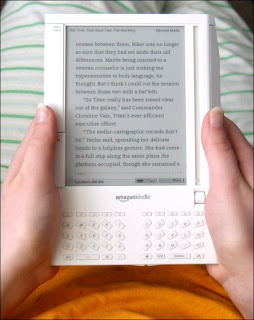Amazon is at the helm of the developing technology of e-books and e-readers. E-book is short for electronic book, and is basically a digital media version of a traditional book, read on specially made hardware devices, such as Amazon's Kindle, Sony's eReader, and Bookeen's Cybook Gen3. The Kindle works independently of a computer, by downloading e-books over Amazon Whispernet. The cost ranges from free to $10 for a best seller, and subscriptions can be made to newspapers and magazines. E-books can also be directly downloaded from Amazon.com.

Amazon's Kindle
There are a number of advantages to e-book technology, but also drawbacks, and there hasn't yet been the expected market boom. The Kindle, and many of its equivalents, aren't even yet for sale in the UK. However, it is still a developing area, and I expect that over the next decade, as the flaws are ironed out, e-books will be increasingly commonplace.
The main advantage of the technology is that thousands of books that would fill a small library can be stored on one device, thus saving space and paper, ink etc. They never go out of print, and can be reproduced quickly, cheaply and easily. The text size and font can easily be altered to help visually impaired readers, and there is no need to hold the device to read it. The text can easily be converted to audio format, and it can be searched and cross referenced. Also, the e-book market is seen as a more democratic forum for authors, who can by-pass the cumbersome and highly selective traditional publishing industry.
A major drawback is currently the cost and availability of e-readers. The Kindle is currently only available in the US and originally retailed at a steep $399, now lowered to $359. Sony readers have only been available in the UK since Sept 08. E-books can be read on ordinary computers, but most people would find this too cumbersome and inconvenient. Whatever method they are read by, it always requires the use of electricity, on devices that are susceptible to damage, malfunction, wear and tear, or simply becoming out of date. If the device is stolen, the owner could loose a large collection of texts, so everything needs to be backed up. Some people dislike looking at a screen for long periods, and prefer the more aesthetically pleasing nature of a traditional book.
Not all publishers make their books available in electronic format, and up until recently there has been a lack of consensus about format, with some formats only accessible with specific software. Digital Rights Management (DRM) has also been cited as a hinderance to the growth of the market. DRM refers to the way that major content providers such as Apple, Sony and Microsoft limit the use of digital media and devices. It enables them to limit number of copies and which devices media can be transfered to, and also protects copyright holders in ways which aren't covered by existing laws. For example, some e-books can only be opened on the computer they were downloaded to, to prevent copying and distribution. Others are tagged with the purchaser's name to discourage distribution, and many are restricted to prevent tampering and printing, and can only be read with a limited range of software. Some people argue that this is putting off customers, and that people will always find ways of hacking software if they want to.
Most of the drawbacks are surmountable, and I think that once people realize the benefits, e-books will continue to grow in popularity.
Sources:
Article: Amazon's Electronic Book Turns a New Page in the History of the Written Word
- www.independent.co.uk/lifestyle/gadgets-and-tech/news/
en.wikipedia.org/wiki/E-book
No comments:
Post a Comment